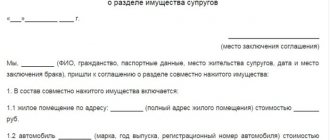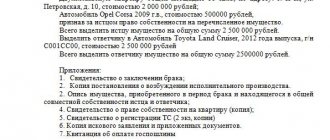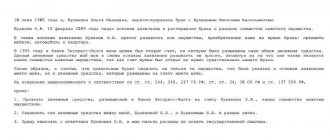There are often situations in life when spouses begin to understand that life together has not worked out. And then we talk about divorce, a rather complex process that includes a number of types of relationships. First of all, former spouses are concerned about the material side of this process, and agreeing on a peaceful division of property after a divorce is very difficult.
In the absence of a marriage contract (and they have not yet become widespread in Russia), there are only two ways out of the situation: voluntarily agree on the division and go to court. Not everyone agrees, and then only the court determines how to distribute acquired property after a divorce. To obtain such a court decision, you need to file an appropriate claim for division, clearly formulate your claims and present reasonable demands for the division of property, which is only possible if you have knowledge of the general norms of the law.
What can be shared and what cannot
A normal, socially adapted family quickly acquires property. And if their life together lasted at least several years, the husband and wife probably accumulated a lot of various “material assets”. To begin with, it is important to understand what can be divided and what cannot be divided.
The RF IC contains a special definition – “jointly acquired property”. It includes everything that was acquired during the marriage. It doesn’t matter which spouse, it doesn’t matter for whom it was issued, it doesn’t matter “from whose pocket” it was paid, it doesn’t matter for which spouse it was intended.
If there was a marriage at the time of purchase, everything purchased is jointly owned, and upon divorce it will be divided in half.
The same goes for debts and loans. No matter who the mortgage is issued to, it is shared! And the entire debt on it must be divided upon separation. No matter who takes out the loan, both spouses are responsible for it.
This does not mean that “everything down to the last thread” is subject to division. Upon termination of joint farming, the following shall not be divided:
- Items for personal use. That is, clothes, shoes, etc. Except for luxury items. What is and what is not a luxury item is decided by the court. That is, the wedding ring or the only fur clothing will not be shared. A diamond tiara or fur coat worth several thousand dollars will most likely be recognized as a luxury item and shared.
- Things and tools through which one of the spouses receives the main income. That is, a private taxi driver's car, a seamstress' sewing machine, a musician's instrument, a compositor's or editor's computer, an expensive photographer's/car repairman's/builder's toolkit, and so on. Even if all this was purchased jointly, in the event of a divorce, it a priori remains the property of the one who earns his living with it.
- Premarital property. As well as inheritance and gifts, regardless of when it was received - before marriage or during it. Including what was given by spouses to each other with the execution of a gift agreement.
ATTENTION! In this area, however, there is an exception. Most often it concerns premarital or inherited real estate. If, for example, during the marriage, a house was rebuilt and landscaped beyond recognition, and its market value increased significantly, it will already be considered joint property on the basis that both spouses contributed to the change in the price of the property. The same thing can happen with an object of art (paying for an expensive restoration) or a car (repair that turns a “junk” into a completely decent vehicle)
- Children's property. Nothing registered in the name of children or actually belonging to children is divided. Even if it is a Stradivarius violin on which a young talent practices, or a house in which the whole family lives. And even more so computers, toys, sports equipment, research equipment.
- Copyrights, patents and other results of intellectual activity of one of the spouses. All of them remain the property of the creator and are not subject to division (unless, of course, the second spouse is included in the certificate as a co-author)
When to divide joint property?
From a legal point of view, whenever. The law allows for division during the divorce process, before and after it. In principle, it is possible to divide the property of spouses without even getting a divorce. Simply, the “married halves” become the personal property of the husband or wife, and if a divorce follows several years later, only what was acquired after the division will be divided.
But from a practical point of view, lawyers do not recommend delaying this. Of course, it is not always optimal to file a single claim (for divorce, child support and division of property). If the divorce is high-conflict, the process will be overly complicated. But after the divorce has taken place and alimony issues have been settled, it is recommended to start dividing the property right away. There are several reasons for this:
- The more time passes, the more facts are lost and forgotten. Checks and receipts disappear. Witnesses forget what happened. Life circumstances change. The persuasiveness of the arguments weakens.
- The value of property decreases over time due to depreciation, wear and tear, obsolescence, and poor preservation. Having decided to divide your dacha plot, after a few years, you may find that its market value has fallen by half: the house is in disrepair, the water pipes are rotten, and you need to uproot the forest growth.
- The statute of limitations for division of property is 3 years. True, not from the moment of divorce, but from the time when the plaintiff discovered that his rights were being violated (for example, he learned that the second spouse was selling a shared apartment). However, if the divorce begins more than 3 years after the divorce, the process will be more complicated.
- The average time for consideration of a case on the division of property, in the presence of serious disagreements between spouses, is several months. If the defendant “diligently sabotages” it or deliberately delays it, the process may drag on even longer. That is, a lot of time will pass until everything is resolved. The sooner the plaintiff gets down to business, the sooner he will receive his part of the property at legal disposal.
- A divorced spouse who remains the actual owner of the property may make illegal transactions with it without your knowledge. After the fact, getting back what was sold, or at least seeking compensation for it, will be, if not impossible, then very difficult. Especially when it comes to valuable movable property that is not subject to registration. It will be necessary to prove not only the illegality of the transaction, but also the very fact of the existence of such objects, their being in joint ownership and the subsequent sale by one of the spouses.
- If you need to divide not only property, but also property obligations, especially loans, this must be done as quickly as possible. Otherwise, the “most conscientious” will suffer. After all, payment documents arrive monthly, and the bank doesn’t care who pays them. With a “deferred division”, the court may not take into account that after the divorce, one of the spouses single-handedly paid for the joint loan for some time. And do not award him any compensation.
Claim for division of property: at what address to file the application?
When determining territorial jurisdiction, you must choose a specific authority to contact. Its representatives will consider the case. The issue is especially relevant in large cities. There may be several branches of courts of the same jurisdiction serving different territories. According to the law, it is necessary to contact the authority located at the defendant’s place of residence. Moreover, the place of residence is the address at which the person is officially registered.
In practice, the court may doubt that the defendant is actually located at the place of residence indicated by the plaintiff. In this situation, the judge will send an application to the migration department. If it turns out that the person does not live at the above address, the proceedings will take place at the place of residence of the other party.
Jurisdiction also depends on the specifics of the particular case. The judge takes into account whether the apartment is involved in the dispute, and also takes into account other factors.
Territorial jurisdiction: division of an apartment or house
Jurisdiction in a property division case is influenced by the presence of real estate. In this situation, the classical rules change. You need to contact the court serving the territory in which the object is located. Please note that not all buildings are included in the category. Real estate is recognized as:
- Plots and houses;
- Apartments in multi-apartment buildings;
- Non-residential real estate used for commercial purposes.
What distinguishes real estate from temporary buildings is its strong connection to the foundation. Buildings included in the category cannot be moved without causing significant damage.
In practice, the statement of claim may state a demand for the division of several objects at once that are located far from each other. This complicates the determination of jurisdiction. Typically, a citizen’s requirements are considered at the location of the most expensive object.
How to determine jurisdiction when dividing property if the plaintiff does not know where the defendant lives
If a married couple breaks up, the ex-spouses often no longer keep track of each other's whereabouts. As a result, one of the spouses may disappear from view before the start of the property division procedure.
According to the law, to determine jurisdiction, one must be guided by Art. 29 Code of Civil Procedure of the Russian Federation. The claim must be filed at the last place of residence of the potential defendant. If it is unknown, you need to go to court at the location of the property owned by the defendant. The plaintiff has the right to independently choose which of the two above options to use.
When to file a claim for division of property
As already mentioned in the previous section, the law provides for a statute of limitations regarding the division of property after a divorce. However, it is quite difficult to understand this issue, since several legislative norms are in force at the same time:
- Article No. 38 (clause 7) names the limitation period (3 years), but does not specify from what moment the countdown begins. That is, guided by it, judges seem to have the right to consider the date of divorce to begin the statute of limitations.
- At the same time, Article No. 9 of the RF IC states that with regard to the limitation periods, the rules of the RF IC correspond to the Civil Code of the Russian Federation - general civil legislation.
- And Article No. 200 (clause 1) of the Civil Code of the Russian Federation prescribes the beginning of the statute of limitations for a claim for the division of marital property from the moment when the plaintiff became aware of the violation of his rights to property.
- And this corresponds to the resolution of the Plenum of the Supreme Court of the Russian Federation No. 15, adopted back in 1998.
That is, to put it simply, the statute of limitations begins to expire only when the plaintiff has reason to fear for the fate of his property, which is actually in the use of the former spouse. For example, he finds out that the ex-spouse is in the process of selling an apartment that is subject to division, or has already done so.
In 2021, the Supreme Court set another precedent on this topic. 8 years after the divorce, the woman received the right to half of the house, which her ex-husband bequeathed to his new family. However, this process took her a lot of time and required her to go through three courts. The city court recognized that she was right, the defendants successfully won an appeal to a higher authority, and only by the decision of the Supreme Court during the cassation process was the claim finally satisfied.
So, you can legally receive your share of property many years after the divorce. But the more time passes, the more difficult and longer the process will be.
ATTENTION! In some cases, the moment of divorce may still be considered the beginning of the statute of limitations. For example, if neither spouse infringed on the rights of the other, then after three years after the divorce, a claim for “division after divorce” will not be accepted. Since the cause of action (the divorce itself) took place more than three years ago.
But, for example, the intention of one of the spouses to sell, donate, or bequeath the entire undivided joint property may become the basis for filing a claim by the other. This fact indicates a possible violation of the property rights of the second spouse, and from the moment it occurs, a new statute of limitations begins.
Where should I go when dividing property?
In case of disputes about the division of jointly acquired property of spouses, a claim for the division of material assets is filed in court. During marriage or, starting from the moment of divorce, the spouses' assets are divided into parts due to both parties over a period of three years.
In accordance with part two of Art. 9 of the RF IC, if one party hid acquired material wealth, then three years are counted from the moment when the second party became aware of this fact.
A claim for divorce and division of real estate, car and business is considered with the consent of the other party to the divorce process and division of property. Documents on the division of property after a divorce are submitted to the court at the place of registration of the plaintiff.
The following must be submitted along with the application:
- list of property;
- estimated value of material assets;
- receipt of payment of state duty;
- certificate of divorce;
- plaintiff's passport.
Is it possible to file a claim for division of property after a divorce?
Yes. As already mentioned, property can be divided in court at any stage of family life. Sometimes it is more convenient to do this after a divorce.
In the case where a couple has the right to divorce through the registry office (they have no children, or the children are already adults), this is the most natural way. There is no one to pay alimony, so divorce proceedings do not require court. Consequently, the marriage is first dissolved in the registry office, and then, if an agreement cannot be reached, the judicial division of property follows.
Sometimes spouses continue to use property together for a long time - take turns driving a car or living under the same roof, maintaining a separate household. In this case, the need for legal division may not arise for a long time. Until one of them wants to dispose of their share of the property differently.
Let us give several examples from real judicial practice.
Example 1
After the divorce, spouses A and B continued to live in the same house, together with their adult children. All agreements on the joint use of the premises of the house were concluded orally. In fact, the house was not divided - it had a common entrance and one set of common areas (kitchen and bathrooms).
For several years there were no disagreements, but then A decided to move to another city and rent out his half of the house. A dispute arose between the co-owners of the premises, which B was forced to resolve in court.
The court found the house not subject to actual division, therefore A had only a share in its value, and not the right to rent out part of the premises.
Example 2
After the divorce, spouses A and B continued to use the dacha together, agreeing on who and when to relax on it. The dacha was registered in the name of V. There were no disputes.
After 5 years, A married again, and began to come to the dacha with his new wife and soon-born child (without violating the agreement on the order of use of the dacha).
Spouse B filed a claim for division of property, but the claim was dismissed on the grounds that the statute of limitations had expired and A's actions did not infringe on B's rights to the joint property. She still had the right to half its value and the opportunity to use the dacha.
Example 3
Spouses A and B had a house that was legally owned by A, although in fact it was joint property, since it was built during the marriage. After the divorce, B moved in with relatives. And he got married again and stayed in the house with his new family. There was no division of property.
After 4 years, A died tragically, his new wife and her child from A became the heirs of the first priority by law. B filed a claim for her right to half of the house. The claim was granted, despite the fact that more than three years had passed since the divorce.
Example 4
A year after the divorce (without division of property), A learned that her husband B had sold a house in the village that was jointly owned. She filed a claim. The court ruled that B must return to A half the price of the house sold.
Regulatory documents on divorce proceedings
Family relations and divorce proceedings are regulated by the Family Code of the Russian Federation. Thanks to the marriage contract, spouses establish contractual relationships and determine property ownership during the conclusion of the marriage contract.
When the relationship is not officially formalized, then issues of division of property between spouses are resolved in court form, Chapter 7 of the IC or based on the Civil Code of the Russian Federation. The Civil Code of the Russian Federation is addressed when dividing property between spouses living in an unregistered marriage—a “civil” marriage. This marriage is not official, but the dispute between both parties is resolved in court.
In such circumstances, a claim is not filed for division of joint property, but for joint shared ownership.
Claim procedure
So, if the property acquired jointly by the spouses cannot be divided peacefully, a trial is pending.
The judicial procedure for partition includes several procedures:
- Filing a claim
- Making claims
- Formation of evidence base and presentation of it to the court (this can be documents and/or witness statements)
- Trial (consisting of one or more hearings)
- Making a verdict and drawing up an act detailing which object becomes whose property
- If one of the parties is dissatisfied with the result, it can file an appeal within 30 days before the decision enters into legal force
Which court considers the division of property during a divorce?
Division of jointly acquired property refers to property claims. When submitting an application, you should indicate in the “Head” of the document the so-called “claim price” - the value of the disputed property to be divided.
ATTENTION! The fee depends on the value of the claim. Property claims, unlike others, do not provide for a fixed fee amount. It is calculated individually, depending on how much valuable property is divided. The plaintiff must indicate the price of the claim equal to half the total cost, since he is claiming half.
Cases on the division of joint property are considered by magistrates and territorial (district, city) courts. However, the maximum cost of a claim in a magistrate’s court is 50 thousand rubles.
That is, if we are talking about dividing a house, apartment, summer cottage, or even a car, you should go straight to the territorial court. The world court will not accept such a claim.
A territorial court may consider the division of property worth less than 50 thousand (for example, if spouses share household furnishings or household appliances), but only if the claim for division of property also contains other demands (for divorce, alimony, communication procedures) with children, etc.)
The claim must be filed at the place of residence of the defendant. In order for the plaintiff to have the right to file a claim at his place of residence, good reasons are needed (disability, living with small children and/or disabled people, etc.)
Filing an application for division of property to court
You can file a claim for division of joint property of spouses at any time. This can be done during marriage, during divorce, after divorce. You can divide all property, down to the forks and spoons. Or you can share only one thing. You can divide things one by one by filing claims for each item of property.
An important point in the statement of claim for division of property is the indication of the date of actual termination of the marital relationship. On this day, you could separate, have a final quarrel, or commit other actions that clearly indicate the end of your family relationship. From this date, all property acquired by spouses can be recognized as personal value.
| Pay special attention to the deadlines for filing an application for division of property! |
Please note that the period for dividing property is limited to 3 years. But not from the moment the family relationship ends. The period begins to run from the day when the second spouse learned of the violation of his rights. For example, after a divorce, spouses still have a dacha for joint use. Each of them came there freely and used it without any restrictions. 5 years after the divorce, the wife, in whose name the dacha is registered, decides to sell it. In this case, for the husband, the period for filing a claim in court for division of property begins to count from the moment he learned about the possibility of sale.
After a statement of claim for the division of joint property of the spouses has been drawn up, it is submitted to the court. When calculating the cost of the claim, the value of the property to be divided is needed. If the value of the property is up to 50,000 rubles, the plaintiff files a claim with a magistrate. Over 50,000 rubles - to the district court. When it comes to dividing real estate - according to the location of the property.
Before filing a statement of claim, you must send a copy of it and attached documents to the defendant. You will need to attach a receipt to the statement of claim to the court - a postal receipt with a list of the contents, a report by email. Or other documents confirming the sending to the defendant a copy of the statement of claim and the documents attached to it, which he does not have.
Be prepared to present property documents to the court. Such documents will definitely be required for real estate and cars.
How to draw up a claim correctly?
The rules for writing claims are set out in detail in Article No. 131 of the Code of Civil Procedure of the Russian Federation. The requirements apply to both form and content. The statement of claim is drawn up in accordance with the general rules for maintaining business documentation (“Heading” at the top right, “Title” in the center, a statement of the essence along the entire width of the page, date and signature at the bottom). Handwritten (in legible handwriting) and typewritten versions are accepted. Errors, crossing outs, and corrections are not allowed. The writing style is businesslike and official.
The claim is written in free form, but must contain the following information:
- Name of the court, full name and address of the plaintiff, full name of the defendant, price of the claim - in the “Hat”
- “Statement of claim for division of joint property of spouses” - title
- This is followed by the main part, in which you must indicate: Place and time of marriage and/or divorce
- Information about joint children (presence, dates of birth, with whom they live)
- Was the property previously divided, was a marriage contract drawn up, was a voluntary agreement on the division of property concluded?
- A complete and detailed list of divisible property: name of the object, its location (if we are talking about real estate), characteristics, time and place of purchase, what documents confirm the ownership, etc.
- Divide all property in equal shares
A sample of such a claim can be found on the Internet. It is enough to understand it and draw up your own document by analogy. You can also seek advice from a lawyer online. A qualified specialist will answer questions, tell you how and in what order to write what, or give a secure link to download the sample.
Sample statement of claim for division of joint property of spouses
| In ___________________________ (name of the court) Plaintiff: _______________________ (full name, address of residence) Defendant: ____________________ (full name, address of residence, place and date of birth, place of work (if known), one of the identifiers, if known to the plaintiff, is a passport, SNILS, INN, driver's license details) Cost of claim: ____________________ (the entire amount of the claims) Statement of claim for division of jointly acquired property of spousesThe plaintiff and the defendant _________ (full name of the defendant) since “___”_________ ____ were in a registered marriage. Record No. ___ of marriage was made by the Civil Registry Office ______ (name). “___”_________ ____ our marriage was dissolved on the basis of _________ (indicate how the marriage was dissolved, by the decision of a magistrate or through the registry office). To date, we have not carried out a division of jointly acquired property. Agreements on the division of property cannot be concluded voluntarily. The plaintiff and defendant cannot reach an agreement on the procedure for dividing property acquired during marriage. During the marriage, we jointly acquired the following property: _________ (give a list of property; indicate the dates of acquisition of the disputed property; types of transactions under which the property came into joint ownership; the value of the property subject to division; indicate which of the parties the disputed property was registered in the name of), for a total amount of _______ rub. In accordance with Article 39 of the Family Code of the Russian Federation, when dividing the common property of spouses and determining shares in this property, the shares of the spouses are recognized as equal, unless otherwise provided by the agreement between the spouses. I believe that the following property is subject to transfer into my ownership: _________ (give a list of property to be transferred into the ownership of the plaintiff) in the amount of _______ rubles, since _________ (indicate the reasons why the listed property is subject to transfer to the ownership of the plaintiff, why it contains more needs or is interested in using this property). The following property is subject to transfer to the ownership of the defendant: _________ (give a list of property to be transferred to the ownership of the defendant) in the amount of _______ rubles, since _________ (indicate the reasons why the listed property is to be transferred to the ownership of the defendant, why he needs it more or is interested in it) in the use of this property). According to Article 38 of the Family Code of the Russian Federation, the division of property between spouses is carried out during marriage and after divorce. Any spouse can make such a claim. When dividing property, the court determines what property is to be transferred to the spouses. If one spouse is given property that is worth more than their share, the other spouse may be awarded compensation. Since the value of the property to be transferred to the plaintiff is greater (less) than the value of the property to be transferred to the defendant, on the other hand, compensation for the excess value of the share in the amount of _______ rubles is subject to recovery. based on the following calculation _________ (give calculation of compensation). Based on the above, guided by Articles 131-132 of the Civil Procedure Code of the Russian Federation, Ask:
List of documents attached to the application:
Date of application “___”_________ ____ Signature of the plaintiff _______ |
statements:
Statement of claim for division of jointly acquired property of spouses in marriage
Statement of claim for divorce and division of property
Statement of claim for division of property after divorce
Statement of claim to determine the spouses' shares in the apartment
List of documents attached to the claim
Copies must be attached to the statement of claim:
- Passports
- Marriage or divorce certificates
- Children's birth documents
- Title documents for each property
- Documents confirming that property that is not subject to division is in personal ownership
- Receipt confirming payment of the fee
- Other documents at the request of the court, legal advice or your own decision (if you think they will be useful)
It is necessary to prepare three copies of the statement of claim (a personal signature is placed on each separately), and three copies of each attached document. Except for the duty receipt. When filing a claim, you will need only one copy, the original.
State duty
It is better to pay the state fee before filing a claim. Details of a specific judicial authority for payment should be found out in advance. But this can be done after all other documents have been reviewed by the court office and found suitable for acceptance. You will be given details and given a deadline within which to pay the fee and bring a receipt or bank check.
The amount of the fee depends on the value of the claim and can range from 400 to 60,000 rubles. The calculation formula is contained in Article No. 333.19 of the Tax Code of the Russian Federation. A fixed amount is paid on the price of the property, within certain limits, plus an interest rate.
We discussed this issue in more detail in the article “State duty for the division of property during divorce in 2019.” Read it carefully, and if independent calculation still seems too complicated to you, contact our lawyers at Prav.io.
Trial and judgment
When considering a case, the court listens to both sides, analyzes their arguments and evidence. If necessary, the judge can appoint an independent expert to evaluate the property (in whole or in part), as well as ensure the protection of property. Protective measures include a ban on alienation (sale) or even temporary seizure of shared property.
ATTENTION! According to judicial practice, in the vast majority of cases, marital property is divided into two equal shares. The justification for this decision is the already mentioned articles No. 34 and 37-39 of the RF IC. If the property is physically impossible to divide equally, the spouse who received the smaller share is awarded compensation from the owner of the larger share
However, in exceptional cases, division into unequal shares is possible. The spouse with whom the children live can receive a larger share. The smaller defendant, whom the plaintiff reasonably accuses of dishonest spending of the family budget (for example, that he did not work for an unjustifiable reason, or, because of his addiction to alcohol, drugs, gambling, even before the divorce, had to sell part of the joint property in order to cover debts).
When dividing property, the court takes into account many factors: living conditions, health, type of activity, level of income, etc.
Example
Citizen A, a year after the divorce, filed a claim for the division of a car belonging to her husband B. B purchased a car on credit before marriage. That is, according to the law, it was his personal property, not subject to division.
However, A stated that the balance of the loan was paid after the marriage, from the family budget. She also stated that during the marriage, the car was involved in an accident and expensive repairs were also paid for from common funds.
During the divorce, the spouses agreed to share a vehicle. But after a few months, B moved to another city, and fulfilling the agreement became impossible. And a month later, A found out that her ex-husband sold the car (without hindrance, since it was registered in his name). She went to court.
The court examined the documents presented by A (loan agreement, bank statements, accident report, damage assessment, receipts for spare parts and a repair agreement with a service station), and came to the conclusion that the car is the joint property of the family. The court verdict ordered B to pay his ex-wife half of the proceeds from the sale of the car.
Section of mortgage and loan property
How to divide living space purchased under a mortgage agreement? The answer is simple: according to the Federal Law on Mortgage, an apartment registered under a mortgage during marriage is common. Subject to equal distribution of shares, regardless of who the contract was drawn up for.
All mortgage payments are divided equally. When dividing an apartment, credit debt is divided between the parties in accordance with paragraph three of Article 39 of the RF IC.
The division of real estate is a difficult issue that cannot be resolved without knowing all the intricacies. It is influenced by a lot of factors. There is no absolute certainty about what decision the court will make. Therefore, before filing a claim for division of property in court, it is recommended to obtain advice from experienced lawyers. This will help clarify controversial points and clarify the nuances of a specific situation.
Settlement agreement
It's never too late to reconcile and come to an agreement. Even though the trial is in full swing. The former spouses still have the opportunity to settle the matter peacefully until the last moment.
A settlement agreement between them can be concluded at any stage until the very moment the judge retires to the deliberation room to make a final decision.
The court will analyze the agreement, and if it is convinced that it does not infringe the rights of any of the parties, it will approve it with its decision. After which the former spouses will only have to fulfill what they agreed on.
Enforcement proceedings
If the division of property was carried out simultaneously with the divorce, the former spouses still have to obtain a divorce certificate. If the case of division of property was considered later, the divorce documents are already in hand.
All that remains is to actually take possession of the divided property and re-register real estate or shares in them, guided by a court decision.
If the ex-spouse prevents this action, it is necessary to contact the FSSP and open enforcement proceedings. The bailiffs will collect from him everything that is due in court, forcibly.









